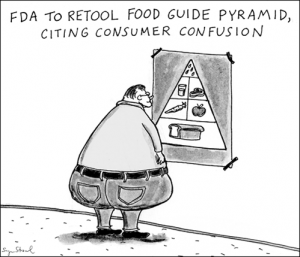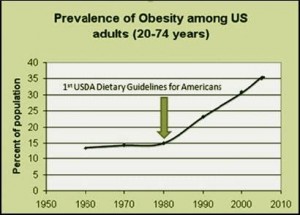Why eating fat doesn’t make you fat!
 The widespread promotion in the U.S. of eating a low-fat diet began many decades ago. Since eating a low-fat diet almost always means eating a high carbohydrate diet, Americans have increased the carbohydrate content of their diet, especially highly refined, nutrient-empty carbohydrates. As the carbohydrate content increased so did the obesity of the people who were following government and medical advice to eat less fat.
The widespread promotion in the U.S. of eating a low-fat diet began many decades ago. Since eating a low-fat diet almost always means eating a high carbohydrate diet, Americans have increased the carbohydrate content of their diet, especially highly refined, nutrient-empty carbohydrates. As the carbohydrate content increased so did the obesity of the people who were following government and medical advice to eat less fat.
The misconception of eating fat causing fat deposits is the result of misunderstanding how the body processes dietary fats, proteins, and carbohydrates. Our bodies are designed to use a balance of all three macro nutrients, with the carbohydrates providing the quick energy because they are converted immediately to glucose, the body’s blood sugar. The fats are converted much more slowly and provide the basic source of continued energy for the body.
Starting a fire provides a good analogy for our understanding the relative value of dietary carbohydrates and fats in providing energy for our bodies: carbohydrates function like kindling does to quick start the fire. Carbohydrates give us quick energy for a few minutes; however, fats are like the logs which burn for a long time to maintain a more constant level of heat (the energy to sustain us for hours). Starting a fire doesn’t require a lot of kindling, but we may require several big logs to keep the fire going to provide warmth or heat for cooking. Our diet doesn’t require a lot of carbohydrates for proper functioning; however, we do need adequate fats to provide long-term energy. The proteins we eat are primarily building blocks for the body’s processes, but they can also be used as energy when needed. We find it more difficult to overeat fats and proteins because we feel satiated; however, we can continue to eat carbohydrates, especially refined carbohydrates, well beyond the amount needed for energy, maybe, in part, because carbohydrates do not contain enough of the fat soluble nutrients which the body is lacking (and craving) on a high carbohydrate diet.
When we eat too many carbohydrates, which are immediately converted to glucose, our blood sugar levels rise quickly. To regulate the quick rise in blood sugar (glucose) levels, the body produces insulin to restore normal blood sugar levels . The insulin stimulates the liver to convert the excess glucose into glycogen for storage. When the liver and muscle tissues are full of glycogen, the liver converts the remaining excess glucose to triglycerides and cholesterol for storage, i.e., fat deposits.
Eating fats does not cause fat storage in the same way as eating carbohydrates for several reasons. Dietary fats are converted to glucose much more slowly and are, therefore, much more likely to be used as steady energy by the body rather than being stored. Also, fats do not cause the quick, steep rise in blood sugar which leads to increased insulin production in an attempt to restore normal blood sugar levels.  Therefore, eating a high carbohydrate diet is one of the primary causes of stored body fat, not eating fats. Another reason we may be able to continually consume high amounts of carbohydrates is because they are quickly removed from the blood and sent to storage. Without the fats to provide a steady source of additional blood sugar, blood sugar levels can fall below the levels needed by the body for energy causing the lows commonly associated with hypoglycemia.
Therefore, eating a high carbohydrate diet is one of the primary causes of stored body fat, not eating fats. Another reason we may be able to continually consume high amounts of carbohydrates is because they are quickly removed from the blood and sent to storage. Without the fats to provide a steady source of additional blood sugar, blood sugar levels can fall below the levels needed by the body for energy causing the lows commonly associated with hypoglycemia.
To maintain proper body function, we need the slower, steadier supply of energy that is provided by dietary fats. The high refined carbohydrate American diet has contributed to the obesity epidemic because of the way the body processes glucose and tries to maintain proper blood sugar levels.
This post is based on a homework essay for my course work with the Nutritional Therapy Association.
For more information about how the body processes blood sugar, you can read any basic text on Anatomy & Physiology.
Other sources of information:
The Oiling of America by Mary G. Enig, PhD, and Sally Fallon
Life Without Bread by Christian B. Allan, PhD, and Wolfgang Lutz, MD
Know Your Fats: The Complete Primer for Understanding the Nutrition of Fats, Oils, and Cholesterol by Mary G. Enig, PhD
Why We Get Fat and What To Do About It by Gary Taubes
Illustration credit: The Weston A. Price Foundation

Great understandings shared, Thank You! Are you taking the at home course or are you close enough to take the course in person?
I’m taking the distance learning program. The class will have three workshops together, but everything else is done through online classwork. It’s a well designed program, and I’ve already learned a lot about nutrition, physiology and health. It does require much study time so I haven’t been able to post as often as I would like about the things I’m learning. I highly recommend the program.
Gary Taubes book “Good Calories, Bad Calories” (if you have the dedication to read it from cover to cover as I did) gives the science behind this and explains the research done over the past 60 years that supports this. Basically, whenever you consume carbohydrates you trigger the insulin response which has the effect of storing fat on the body. Eating fat does not trigger this response.
I agree, I’ve read Gary Taubes Good Calories, Bad Calories. It is excellent for a detailed explanation of the science behind carbohydrate and fat consumption. I listed his Why We Get Fat and What To Do About It because it provides much of the same information but in a simplified shorter, easier to read version.
Pingback:10 Reasons Cholesterol Is Necessary for Health | Real Food Houston
Pingback:Crisco – how marketing trumped nutrition! | Real Food Houston
Pingback:Why Women Find It Harder to Lose Weight Than Men! | Real Food Houston